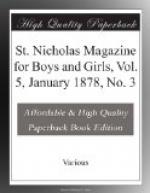I will now write about the wire-cable railroads of this city. The first one constructed was on Clay street, between Kearney street and Leavenworth street. The road has now been continued out to Van Ness avenue.
The second was constructed
by the Sutter Street R.R. Company from
Sansom street to Larkin street,
a distance of one mile.
The best of all the railroads in the city is on California street, between Kearney and Fillmore streets, a distance of two miles. It is considered the best built wire-cable road in the United States, and is owned by the great railroad king of California, Leland Stanford.
I have a little railroad track
seven and a half feet long, with
fifteen feet of string, which
I call a cable. The invention of the
gripping attachment is my
own.
R.H. BASFORD.
* * * * *
DEAR ST. NICHOLAS: Will
you please, for a few moments, imagine
yourself blind, deaf and dumb,
so that you may have a fair idea of
the boy about whom I want
to tell you?
His name is James Caton. He is fifteen years old and lives in the Deaf Mute Institution, on the Hudson River, near New York. He was born deaf and dumb, and two years ago a severe sickness left him blind. Before this he had learned to read and write, and talk with his fingers. He uses a pencil and his fingers to ask for what he wants, and tell you how he feels. People can talk to him by spelling words with their fingers against the palm of his hand, and he is so bright and quick that they cannot spell too fast for him. He is fond of his lessons, but sometimes, in adding a long column of figures, he makes mistakes that vex him sadly. Only think how hard it must be to add twenty or thirty large numbers that you cannot see! But when James finds his temper rising he puts it right down, calls back his patience, and goes to work more strenuously than ever. One day, his teacher, a lady, told him the Bible story of Cain, who killed his brother and became a wanderer. Some time after, she asked him “Who was Cain?” and he answered, “Cain was a tramp!” She takes pains to tell him about the great events of the day, such as the dreadful war between Russia and Turkey, and he understands this so well that he can describe it with wonderful effect. He stands out on the floor like an orator, and with the most graceful, animated and expressive signs and gestures, gives the positions of the armies, their meeting, the beating of the drums, the waving of the flags, and the firing of the cannon. Watching him, one can see the battle-field and all its pomp and horror.
James was in the country during the summer, and there he lay on the soft grass, smelled the sweet flowers, and tried to remember their forms and colors. He leaned against the strong tree trunks and measured them with his arms, and the




